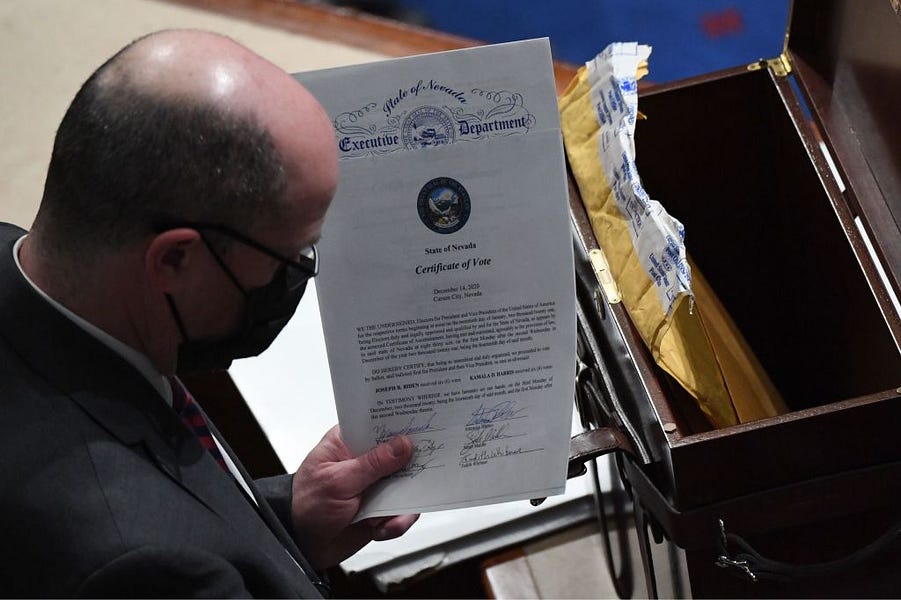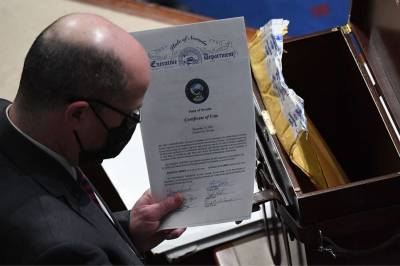Though this week’s House vote on legislation to overhaul how Congress certifies election results turned contentious, the Senate version won new supporters, with other Republicans saying they could sign onto it in the future.
Pennsylvania Sen. Pat Toomey became the 11th Republican to back the Senate Electoral Count Act reform. If all Democrats support it, that’s more than enough to overcome a filibuster. Toomey told reporters Thursday the original Electoral Count Act “was badly drafted when it was written back in the 19th century, literally.”
“We should clean it up and tighten it up and make it clear that Congress isn’t here to opine on the validity of particular electors and the vice president does not have the discretion to accept or reject,” Toomey added.
Kentucky Sen. Rand Paul also said he is “open to the concept of the bill.” Whether that turns into real support later remains to be seen.
Senators will debate the legislation and incorporate recommendations from constitutional law scholars next week, according to Sen. Susan Collins, a Republican who introduced the bill. She said she believes that committee meeting “will give us further momentum.”
Lawmakers hope to pass the changes before the end of the year, intended to prevent the events of January 6, 2021, from recurring.
Collins’ bill differs from the House version in several ways, as we wrote to you earlier this week. The Senate version would require support from one-fifth of each chamber to lodge objections to state slates of electors, where the House would require support from one-third of each chamber.
“We are in complete agreement with the House that having just one member in the House and the Senate be able to trigger an objection is far, far too low,” Collins said of that difference. “But that’s something that I think will be resolved in conference.”
While the Senate bill added new cosponsors, the House version landed with a thud among most Republicans. Only nine—none of whom are up for reelection in November—voted for the bill alongside Democrats when it came to the floor Wednesday. One of those Republicans told The Dispatch he almost voted against it because of the process: House leaders didn’t hold committee hearings on it and brought it to the floor just a few days after sponsors introduced it.
That was one reason many Republicans opposed it. Rep. Barry Loudermilk, a Georgia Republican, said GOP members should have been included in the process all along. Other rhetoric about the bill was more ludicrous, particularly coming from people who voted to overturn the election results. Some members claimed it was “nothing more than an attack” on former President Donald Trump. And many likely wrote it off when they saw Rep. Liz Cheney’s name on it.
Still, few members attacked the bill’s substance. Even as they opposed it during floor debate, some Republicans said they might be able to support the Senate version or would back a pared down bill that would just raise the threshold for lodging objections during the vote certification process.
Will Ukraine Aid Flow With a GOP Majority?
Sen. Chris Murphy shared a dire prediction with reporters earlier this week: “If Republicans win a majority in the House and the Senate,” he said, “I don’t think you can count on Congress continuing to support Ukraine.”
It’s not an unfounded fear—we’ve written to you in this newsletter a few times about congressional Republicans’ growing uneasiness about military support to Ukraine, and about how the size of the House majority, if Republicans win it, could reduce House GOP Leader Kevin McCarthy’s sway over his members. The far-right faction of the party is set to grow in January, and those members are most likely to oppose Ukraine assistance. At the very least, it could complicate future aid packages and add to the “no” votes. But Murphy suggested their stance could grow more popular among Republicans who have largely supported Ukraine since Russia launched its war earlier this year.
“I think there’s going to be long-term erosion of Republican support for Ukraine aid,” Murphy said. “President Trump’s decision to attack Ukraine aid and attack Republicans who support it is going to have an impact.”
One senior Republican on the House Appropriations Committee brushed off Murphy’s concerns this week.
“He’s just wrong,” Rep. Tom Cole of Oklahoma said in an interview Wednesday.
“I mean, 57 Republicans voted no on a $40 billion package out of 213,” Cole said of the last major Ukraine aid bill, which passed in May. That tally was unique: Most votes related to Ukraine until that point were close to unanimous in the House, with fewer than a dozen Republicans opposing them. The significantly higher GOP pushback to the $40 billion package, Cole said, had merit.
“A lot of their objection, honestly, was simply, ‘We didn’t get this in time, there’s no detail, you’re not telling us much, we haven’t gone through a normal process,’” Cole said. “That’s a fair thing for the minority to raise.”
Cole backed the package in May, and he expects most Republicans to continue their support to Ukraine.
“In my experience around here, Republicans are a lot more likely to remain committed to a military project than Democrats are,” Cole added. “And that was true in Iraq, that was true in Afghanistan, true with Vietnam. It was true throughout the Cold War from the ‘60s on. It’s certainly true here.”
The next test of support for Ukraine will unfold soon, as lawmakers debate new aid to Ukraine in a short-term government funding package that could come up next week.
Sen. Richard Shelby, the top Republican on the Senate Appropriations Committee, told reporters Thursday “we would think that would be in there” but declined to share how much funding Congress may approve. The Biden administration requested $11.7 billion in new humanitarian and military assistance to Ukraine earlier this month.
Read more about the Republican Party’s Ukraine policy dynamics in this piece from Defense News’ Bryant Harris and Joe Gould.
‘This was Blatantly Antisemitic’
My colleague Audrey caught up with House Democrats about Rep. Rashida Tlaib’s comments this week that Democrats can’t call themselves progressives if they support Israel’s “apartheid government.”
“I want you all to know that among progressives, it has become clear that you cannot claim to hold progressive values, yet back Israel’s apartheid government,” Tlaib, who is of Palestinian descent, said Tuesday. Her comments came during a virtual seminar Tuesday hosted by Americans for Justice in Palestine Action and co-sponsored by American Muslims for Palestine, according to the Jerusalem Post.
Tlaib’s comments drew condemnation from several pro-Israel Democrats, including Rep. Debbie Wasserman Schultz, who is Jewish. In a Wednesday tweet, she criticized Tlaib’s “progressive litmus test on Israel” as “nothing short of antisemitic.”
Wasserman Schultz later expressed frustration at Tlaib’s continued anti-Israel rhetoric despite numerous attempts over the years to find common ground.
“We’ve had so many conversations—private, public,” Wasserman Schultz said in an interview. “We’ve had attempt after attempt to really sit down and help some of our colleagues understand just the kind of language that is offensive, and assume and give the benefit of the doubt over and over that maybe there are some things that they've been saying or assumptions they’ve made that they don’t mean to seem antisemitic.”
“But this was blatantly antisemitic,” she added.
Democratic Reps. Jerry Nadler and Ted Deutch, both of whom are Jewish, also criticized Tlaib’s remarks on Wednesday, as did progressive Reps. Juan Vargas and Ritchie Torres.
Torres said in an interview that Democrats “have a tradition of free expression,” but the anti-Israel Boycott, Divestment, and Sanctions movement “has no place in the mainstream of American politics” and “should be relegated to the fringe where it belongs.”
Democratic Rep. Kathy Manning said she views Tlaib’s continued anti-Israel rhetoric “as a problem” in the House Democratic caucus.
“It’s an appalling statement,” Manning said Wednesday afternoon. “It’s a misrepresentation of what Israel is as a country, and I think it is a misrepresentation of what progressives are.”
Unlike most of her Democratic colleagues, Tlaib favors a one-state-solution to the Israel-Palestine conflict. She has previously come under fire for calling Israel an “apartheid” state.
Congressional Progressive Caucus Chair Pramila Jayapal dismissed Tlaib’s latest comments as a non-issue.
“We’re a big tent and people have very different opinions on different issues,” Jayapal said in a brief interview Wednesday. “I don’t want to draw attention to things that divide us. I want to focus on things that unite us.”
Saving This Quote For Future Reference
Conservative members of the House GOP conference are reportedly pushing for a return to earlier rules governing “motions to vacate the chair,” a process to remove a speaker of the House. House Freedom Caucus members used this in 2015 in their efforts to oust former House Speaker John Boehner. When Democrats took power in 2019, they made it more difficult for members to move to vacate the chair. If Republicans win in November, the Freedom Caucus (and other Republicans) would like to again allow any single member to be able to move to vacate the chair, among other rules changes.
Here’s what Rep. Thomas Massie—a Kentucky Republican who isn’t part of the Freedom Caucus but who is largely aligned with its members—told us about this on Wednesday:
“I think the fixation on vacating the chair is sort of misplaced,” he said. “There’s always a way to take out the speaker. Like when hackers find an exploit, the exploit gets patched and then you go find another exploit, right? There’s a way to change the speaker. You don’t have to use the same path. So there’s always a way. You could just vote against the ruling of the chair like 10 times in a row, and boom, the speaker’s done. Take down the rule for a whole week. Speaker’s done. There’s so many ways to do it. Everybody gets fixated on which parliamentary procedure there is, but that was just the one that was easiest to use.”







Please note that we at The Dispatch hold ourselves, our work, and our commenters to a higher standard than other places on the internet. We welcome comments that foster genuine debate or discussion—including comments critical of us or our work—but responses that include ad hominem attacks on fellow Dispatch members or are intended to stoke fear and anger may be moderated.
With your membership, you only have the ability to comment on The Morning Dispatch articles. Consider upgrading to join the conversation everywhere.